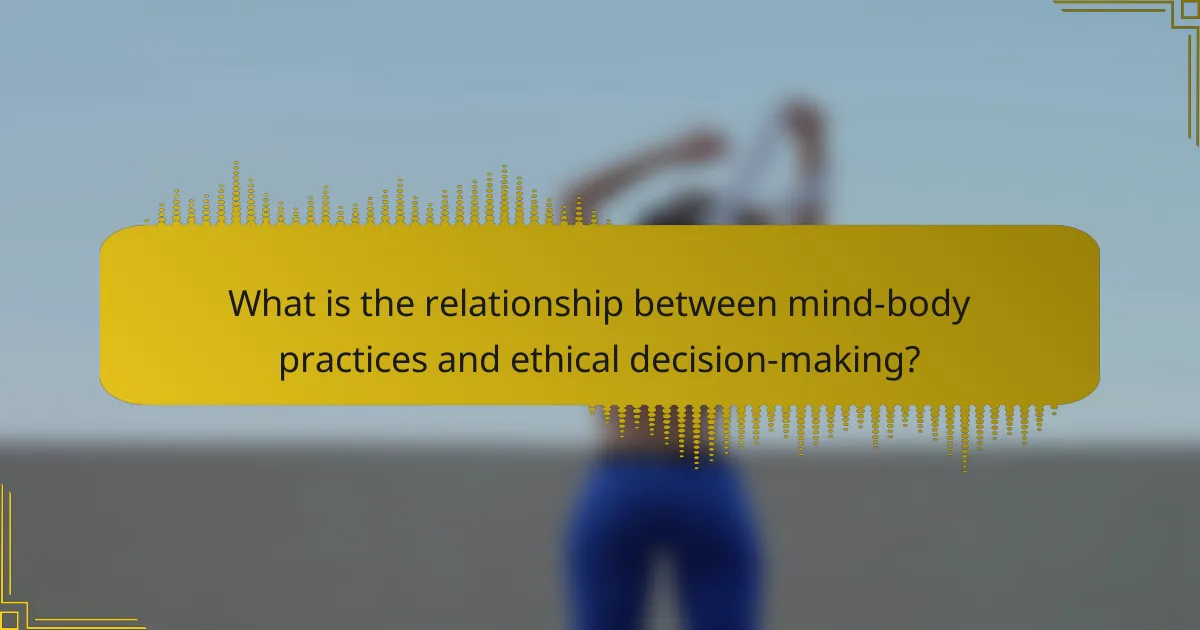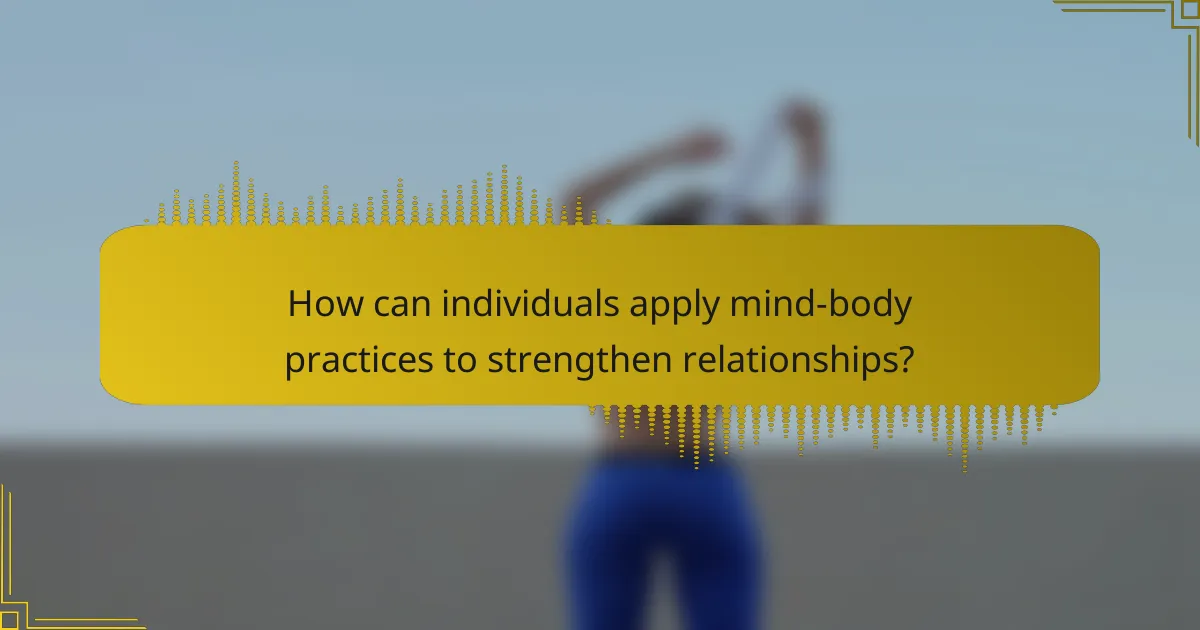Cheating raises complex ethical questions and often feels like a moral failing. Mind-body practices enhance self-awareness and emotional regulation, aiding ethical decision-making. Psychological factors like cognitive dissonance and social norms shape perceptions of cheating as a sin. Exploring unique practices and bio-hacking techniques reveals ways to strengthen relationships and foster commitment to ethical choices.

What is the relationship between mind-body practices and ethical decision-making?
Mind-body practices enhance ethical decision-making by fostering self-awareness and emotional regulation. These practices, such as meditation and yoga, promote mindfulness, which helps individuals reflect on their values and the consequences of their actions. Research indicates that engaging in mind-body activities can lead to improved moral reasoning and reduced impulsivity, thereby supporting more ethical choices. Additionally, the psychological aspect of bio-hacking, which focuses on optimizing mental and physical performance, can further reinforce ethical behaviour by aligning personal goals with ethical standards.
How do mind-body practices influence personal integrity?
Mind-body practices enhance personal integrity by promoting self-awareness and ethical decision-making. Techniques such as meditation and yoga cultivate mindfulness, allowing individuals to reflect on their values and actions. This introspection can lead to a stronger commitment to honesty and accountability. Engaging in these practices often results in improved emotional regulation, reducing the likelihood of impulsive behaviours like cheating. Ultimately, the integration of mind-body practices fosters a deeper alignment between personal beliefs and actions, reinforcing integrity.
What role does self-awareness play in preventing infidelity?
Self-awareness plays a crucial role in preventing infidelity by fostering emotional intelligence and understanding personal motivations. Individuals with high self-awareness can recognise their needs and triggers, reducing the likelihood of seeking validation outside their relationship. This attribute enhances communication, allowing partners to address issues before they escalate. As a result, self-awareness serves as a protective factor against infidelity, promoting healthier relationships.
What techniques enhance self-awareness in relationships?
Self-awareness in relationships can be enhanced through techniques such as mindfulness, reflective journaling, and open communication. Mindfulness promotes presence and understanding of emotions, while reflective journaling allows individuals to process thoughts and experiences. Open communication fosters honesty and vulnerability, deepening emotional connections. Each technique contributes uniquely to personal growth and relational dynamics.
How can meditation shift perspectives on cheating?
Meditation can shift perspectives on cheating by fostering self-awareness and compassion. Through mindfulness practices, individuals can explore their feelings and motivations, leading to deeper understanding. This introspection may reduce impulsive behaviour associated with cheating and promote healthier relationships. Additionally, meditation can enhance emotional regulation, helping individuals respond to challenges with empathy rather than betrayal.

What psychological factors contribute to the perception of cheating as a sin?
Psychological factors such as cognitive dissonance, moral reasoning, and social norms contribute to the perception of cheating as a sin. Cognitive dissonance arises when individuals experience conflict between their actions and moral beliefs, leading them to view cheating negatively. Moral reasoning involves the evaluation of cheating against ethical standards, often labelling it as wrong. Social norms influence perceptions by establishing collective values that condemn cheating, reinforcing the idea of it being a sin.
How does societal conditioning affect views on infidelity?
Societal conditioning significantly shapes views on infidelity, often framing it as morally wrong. Cultural narratives, religious beliefs, and personal experiences influence perceptions of cheating. For instance, many societies emphasise loyalty and commitment, creating stigma around infidelity. As a result, individuals may internalise these values, leading to guilt or shame when faced with temptation. Additionally, psychology suggests that societal norms can dictate acceptable behaviours in relationships, further complicating personal views on fidelity.
What are the emotional triggers that lead to cheating?
Emotional triggers that lead to cheating often include feelings of neglect, unfulfilled desires, and emotional disconnection. These triggers can create a sense of vulnerability, prompting individuals to seek validation or connection outside their primary relationship. Factors like low self-esteem and a desire for excitement further contribute to this behaviour. Understanding these emotional dynamics is crucial for addressing the underlying issues in relationships.
How can understanding these triggers aid in personal growth?
Understanding these triggers enhances personal growth by fostering self-awareness and emotional intelligence. Recognising cheating triggers allows individuals to address underlying psychological issues, promoting healthier relationships. This awareness can lead to improved decision-making and a commitment to personal integrity. Additionally, bio-hacking practices can optimise mental and emotional responses, further supporting personal development.

What unique mind-body practices can help individuals resist the temptation to cheat?
Unique mind-body practices that help individuals resist cheating include mindfulness meditation, yoga, and breathwork. These practices enhance self-awareness and emotional regulation, reducing impulsive decisions. Mindfulness meditation improves focus and clarity, allowing individuals to reflect on their values. Yoga fosters physical and mental discipline, promoting a sense of inner peace. Breathwork techniques help manage stress and anxiety, enabling better decision-making. Integrating these practices into daily routines can strengthen commitment to ethical choices.
What are the benefits of yoga in fostering commitment?
Yoga fosters commitment by enhancing self-discipline and emotional resilience. Practicing yoga encourages mindfulness, which helps individuals stay focused on their goals. This focus translates into increased dedication in personal and professional relationships. Furthermore, regular yoga practice can improve mental clarity and reduce stress, aiding individuals in making more thoughtful decisions. As a result, practitioners often experience a deeper connection to their values, fostering long-term commitment.
How can breathwork techniques support emotional regulation?
Breathwork techniques can significantly enhance emotional regulation by promoting mindfulness and reducing stress. These practices help individuals become more aware of their breathing patterns, which can influence emotional states. For example, deep breathing activates the parasympathetic nervous system, leading to relaxation and emotional balance.
Research indicates that regular breathwork can lower anxiety levels and improve mood. A study found that participants who engaged in breath-focused practices reported a 30% reduction in anxiety symptoms. This unique attribute of breathwork makes it a valuable tool for emotional management.
Additionally, breathwork fosters a connection between mind and body, enabling individuals to process emotions more effectively. By integrating breathwork into daily routines, individuals can cultivate resilience and better navigate emotional challenges.

What rare attributes of bio-hacking can enhance relationship fidelity?
Bio-hacking can enhance relationship fidelity through unique attributes such as emotional resilience, cognitive enhancement, and mindfulness practices. Emotional resilience allows individuals to navigate relationship challenges effectively, reducing the likelihood of infidelity. Cognitive enhancement fosters better communication and understanding between partners, which strengthens bonds. Mindfulness practices promote awareness and presence, helping partners to cultivate deeper connections and satisfaction in their relationship.
How does neurofeedback improve emotional resilience?
Neurofeedback enhances emotional resilience by training the brain to regulate its responses to stress. This practice helps individuals recognise and modify their emotional reactions, leading to improved coping strategies. Studies indicate that neurofeedback can decrease anxiety and increase emotional stability, making it a valuable tool in psychological well-being. Additionally, consistent neurofeedback sessions can result in long-term benefits, fostering a proactive approach to emotional challenges.
What is the impact of bio-hacking on relationship dynamics?
Bio-hacking can significantly influence relationship dynamics by altering individual perceptions and behaviours. Enhanced self-awareness from bio-hacking practices may lead to improved communication and emotional intimacy. Additionally, the psychological benefits of these practices can foster trust and understanding, reducing the likelihood of infidelity. As a result, couples may experience stronger bonds and healthier interactions, reshaping their relational landscape.
What specific bio-hacking methods are most effective?
The most effective bio-hacking methods include intermittent fasting, nootropics, and mindfulness meditation. Intermittent fasting enhances metabolic health and cognitive function. Nootropics improve focus and mental clarity. Mindfulness meditation reduces stress and enhances emotional well-being. Each method uniquely contributes to optimising mind-body practices, aligning with the psychology of bio-hacking.
What lessons can be learned from bio-hacking communities regarding fidelity?
Bio-hacking communities emphasise self-awareness, personal growth, and accountability, which can inform lessons on fidelity. Members often engage in practices that enhance mental clarity and emotional regulation, fostering stronger relationships. These communities promote open communication, which is essential for maintaining trust. Additionally, bio-hacking encourages individuals to understand their motivations and behaviours, enabling them to make conscious choices about fidelity. By integrating mind-body practices, individuals can cultivate resilience against temptations, leading to healthier partnerships.

How can individuals apply mind-body practices to strengthen relationships?
Individuals can apply mind-body practices to strengthen relationships by enhancing emotional awareness and communication. Techniques such as mindfulness meditation and yoga foster self-awareness, allowing individuals to express feelings more clearly. Regular practice can reduce stress, promoting a calm environment conducive to open discussions. Engaging in joint activities like tai chi or partner yoga can enhance connection and empathy, facilitating deeper bonds. As a result, these practices not only improve personal well-being but also nurture healthier relationships.
What are the best practices for integrating mindfulness into daily life?
Integrating mindfulness into daily life enhances mental clarity and emotional well-being. Key practices include setting aside dedicated time for mindfulness meditation, focusing on breath awareness, and incorporating mindful moments throughout the day, such as during meals or walks. Engaging in body scan techniques can also deepen awareness of physical sensations. Additionally, utilising mindfulness apps can provide guided sessions and reminders to cultivate consistent practice. Emphasising a non-judgmental attitude during these practices fosters a greater understanding of thoughts and feelings, promoting overall psychological resilience.
What common mistakes should be avoided in the pursuit of relationship health?
To maintain relationship health, avoid common mistakes such as lack of communication, neglecting emotional needs, and failing to establish trust. These errors can lead to misunderstandings and resentment. Prioritise open dialogue, empathy, and transparency. Recognising and addressing these pitfalls is essential for fostering a strong, healthy connection.
What expert insights can enhance understanding of commitment and fidelity?
Understanding commitment and fidelity involves examining psychological and emotional factors. Expert insights suggest that commitment is influenced by personal values, relationship dynamics, and individual experiences. Mind-body practices, such as mindfulness and meditation, can enhance emotional awareness, fostering deeper connections. Additionally, bio-hacking techniques, like optimising mental health through nutrition and exercise, can strengthen commitment by improving overall well-being. These approaches provide valuable frameworks for addressing the complexities of fidelity and infidelity.